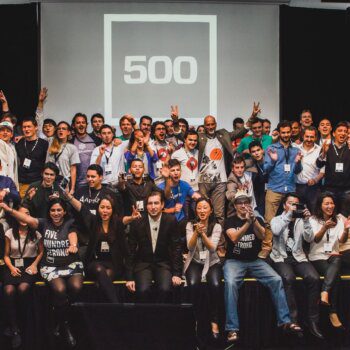I went to TiE Conference 2016 with an agenda. I wanted to know what does it really take to scale a startup. TiE (http://tie.org/) is known for its deep pockets of experience, investments and talent. So if we had all that, what could be needed or lacking in the people and leadership systems?
I spoke to Bob Kruger, seasoned industry executive, advisor and mentor to Alchemist Accelerator and Citrix Startup Accelerator, and current CEO of Apakau (www.apakau.com, a leader in DDoS prevention for dynamic data), and hoped he could shed some light to my questions.
This is Part 2 of a 2-Part discussion with him.
So I want to distill your leadership and “value-addness” to our readers. How did your brain end up knowing to do things this way? What do you accredit for your ability to see these things? And the other question is, how do you convince your teams to change to your way of seeing or doing?
Well, some of it, I’m just wired for. I don’t know how to say that other than I’ve always believed in thinking in a more rounded way. Everybody has their different skills and so that’s one of mine. And also recognizing that there are new ways to do things and so being able to change is important.
Which one will you fit better – Innovator or Entrepreneur?
Kind of both. In a way, more of an innovator than just an entrepreneur because I’m not really your typical businessperson. I’m not a person who just walks around all the time thinking about gross margins and stuff like that. I have to do that because of the nature of my job and I’ve got to put together revenue forecasts and operations budgets and all that stuff but I’m more of a product person and more of a person that sees things from the end-user’s perspective, the customer’s perspective. Here’s the problem I have. Here’s the job I need filled and then being able to serve that to those people to doing it in a way that is generic, not just for that individual but for a broad audience.
So a startup growth developmental process could look like this:
Stage 1 — the founder creates a fantastic product because they’re very good at one skill.
Stage 2 — a CEO or CTO comes in with this perspective. The founders maybe don’t see it or they cannot afford that. They need almost plug-in resources and supports from someone like you. So I’m just trying to figure what are the plug-in resources for startups to accelerate.
Well, the interesting thing is even in the big companies, you don’t have the ability to just grab resources when you need them. I’ve worked at Microsoft, BMC, Citrix; all three of those were very large companies and we used to operate as if we never had enough money or resources and nobody could tell me that Microsoft was cash-poor. But we operated like a small startup because we had to. Because if we didn’t, we’d get fat and lazy or just miss the mark in terms of what the customer needed. Sure, maybe I could go back and ask for more money, but quite often I didn’t because that wasn’t the right answer.
The right answer was how could we do this more effectively. What’s the real problem that we’re trying to solve? Is this what the customer really needs? Or are we going down a path that maybe nice but not the right thing?
I hear repeatedly as I do at lot of these interviews and the startup always say “Oh, we don’t have the money. If we had the money, we would be able to do this.” They don’t go through all these questions you raised. They stop going through those questions.
Yeah. I mean at some point, you have to have cash. You have to have something to pay people, but you don’t always need a lot of people to get things done. It just depends where you’re at and really thinking through what you really need.
Where are you at now with Apakau? What are your next steps?
We’re actually looking for some seed funding because what I want to do is to bring sales on board. I can’t take engineers and say, ‘Well now, you’re salespeople.’ It’s just not going to work.
For something like that, you go to a point that then you have to adjust. You have to seek cash in order to expand. We have a product, we fix the marketing, we got a great message but now we can’t tell people about it, they’re not going to pay for it. We have to add the right people in order to do that. Do we have to go crazy with a lot of people? No. If we’re smart about how we do it, we can leverage outside resources to prospect. We can leverage other ones to maybe help close. I’ll certainly work on the closing but we don’t have to go crazy with the spending in order to do it. But having nothing is not the answer either.
So you have built a sales team before for another startup or advised another startup and sales team before?
I’ve not built a sales team before. So this will be a first for me. But I’ve worked with enough salespeople and I’ve talked to enough customers and with the right advice from people outside, I’ll be fine. I mean there’s – one thing about the tech community is they’re very good on helping people to connect with others and so, I have connections. I’ve worked with other people who headed sales as well.
Many of my interviews also have a challenge getting the right salespeople. It is definitely another key success component for startups as they scale.
Everybody says the same thing. It’s always challenging with sales. It’s always hard to get just the right people. But quite often, if sales is struggling, it’s not a people problem. It’s actually an issue elsewhere. It usually means that the message is wrong, or too complex, or it’s not compelling enough. Or the story as people try to tell it is not done well enough. Or maybe the materials that they’re using are just not engaging enough.
Our founder, again, used to communicate with people and he’d do a lot of blasts with email but the way he wrote was very terse and it was plain text. In contrast with what we have now which is in rich text, it has some nice images, we’ve got tractable links inside of it. I can see if people are opening it and all that. It didn’t take that much additional effort but it was different. Often times with salespeople, they may not have the right tool. If it takes a lot of sentences to tell what your company is about, well then, there’s a problem.
Recap checking: so you’re almost saying the company’s got a great product, great; the story, the one-liner, the material, and collateral must be clean; the salesperson should just be able to just take this and go; and if the end-user knows this is a match for their pain point, there we go. So you don’t think it’s the salespeople that are having challenges selling.
Quite often, although some salespeople are better than others and some products by their nature are much complex and so you have to have more of a conversation. But in a lot of cases, the products are not that complicated, but we make them complicated and so if you give the salesperson a complicated message or a complicated story, then that complication gets magnified when talking to a customer. It just has to be really simple. Remember also when people are prospecting, they’re trying to do 60 to 80 phone calls a day. They’re maybe trying to do 20 email messages. They’re trying to set a fixed number meetings for a day. Well, if they can’t get the message out and have it resonate quickly with someone, then that time is lost.
So I am going to call you a “translator”. You actually help translate complex, terse technical stories come into more simplified end-user understanding.
I’m very good at taking technical stuff and translating it into something simple. At the same time, I can work well with technical people because of my background. And you should know I’m not an engineer by trade. It’s not by degree or anything like that. I have a degree in International Relations. I’m multilingual and all that stuff.
But I’ve always had an affinity for technical stuff. I’ve built shortwave radios and all sorts of things growing up and I decided to get into a career and that career turned out to be computing. I started as a data analyst and I studied on the side, I studied on the job and just picked it up. I’ve learned to code on my own and then learned all sorts of things. I’ve been doing it for so long that I can dive into almost any area. I’m not the most brilliant person. I’m not the person that comes up with all the ideas but I understand plenty. I understand a good idea which is one of the other things that’s very useful for me.
Do you find yourself that you’re almost like a “platform”? Because this person is a tech person, that person is a salesperson, and you bring them together and organize them and then it becomes…
I do it although, again, this is the first time I’ve had to do that with salespeople because I’m a first-time CEO. But in terms of everything else and then just because you have a bunch of engineers on the team doesn’t mean they all get along or see eye-to-eye. More often than not one person doesn’t like the other’s code or have issues with the product managers…
Bob Kruger, Apakau is lucky to have you!
Are you an entrepreneur in search of a great CEO or CTO? What questions or stories can you share with the rest of us on what you look for in a senior leader who is expected to scale the company’s growth. Write to me — let’s unlock the secrets of scale for all companies.
For more information about Apakau, please see www.apakau.com.
For information about Turning Gen Y On, my recently-published book to help leaders overcome workplace challenges with their Gen Y staff, please see http://tgyo.asia/.






























